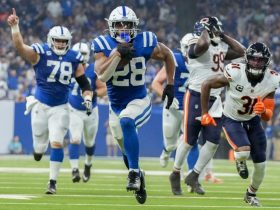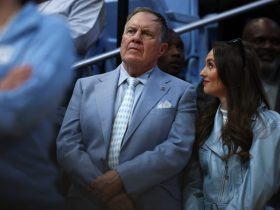ATLANTA – On Texas’ first snap of overtime in the SEC championship game, it wasn’t Quinn Ewers coming out of the huddle but rather Arch Manning.
It was a curious spot for Longhorns coach Steve Sarkisian to insert a quarterback who had barely played all day. It’s also likely going to be a metaphor for the biggest what-if of Texas’ season.
Manning was only in the game to run the ball. After one play, the future of Texas football went back to the sidelines and the present came back in. As it had all day with Ewers at the controls, the Texas offense stalled in the red zone and settled for a field goal. A few minutes later, the Longhorns had lost to Georgia, 22-19.
“We had plenty of opportunities to go capitalize,” Ewers said. “Some games go that way. But it’s cool. With the new 12-team playoff, we get to keep playing ball.”
Indeed, despite entering Selection Sunday with no wins against teams in the committee’s top 25, Texas’ 11-2 record is going to be enough to get this team into the College Football Playoff.
But the Longhorns don’t look like a team that is going to be there long. They haven’t since mid-October. With an offense that can’t run the ball, doesn’t block particularly well, drops too many passes and commits devastating, mind-numbing turnovers, Texas is in danger of wasting the nation’s best defense and squandering a golden opportunity to win a CFP championship that truly seems up for grabs.
And if Texas suffers an early exit in similar fashion to the way it lost to Georgia on Saturday, Sarkisian’s decision to ride with Ewers rather than make the transition to Manning will be the subject of heated debate for years to come.
“This one stings,” Sarkisian said. “It’s hard, but the beauty of it for us is we get a chance to regroup in a couple weeks and get into the playoff and go compete for a national championship, and I think we’re plenty good enough to win that.”
Texas might be collectively. But is Ewers?
The reality is that since beating Oklahoma 34-3, Texas’ offense has been pedestrian for two consecutive months outside of a 49-point outburst against Florida on Nov. 9. The four games after that, Texas scored 20 against Arkansas, had a teeth-pulling 31 against Kentucky, beat Texas A&M just 17-7 in a game they dominated statistically and couldn’t put away Georgia despite holding the Bulldogs to 277 yards.
Some of that is certainly related to Ewers’ health. He missed two games earlier this year with an oblique injury and has been dealing with an ankle sprain late in the season. But no matter what injuries he’s dealing with, Ewers has to be great for Texas to be great.
Against A&M, a pick-six followed by a fumble on the next possession gave the Aggies a chance to hang around in the second half. And against Georgia, Ewers made a couple spectacular, backyard-style throws on third-and-long early on to get drives going. But as the game wore on, he seemed more and more limited in his foot speed, passing accuracy and ability to process what was coming at him from Georgia’s defense. His second interception, with 3:36 remaining in the game, was just a flat-out poor throw into single coverage against minimal pressure.
There were also issues in the first half, as Ewers couldn’t get a touchdown on the board despite three first-half trips to the edge of the red zone. Failing to get that separation on the scoreboard was the biggest reason Texas lost this game.
“I wish we could have executed earlier in the game and stretched the lead,” Sarkisian said. “Late in the game, some of those throw situations and in the overtime was a microcosm of the game. We couldn’t put it in the end zone, and it opened the door for them to score and win the game. If we’re fortunate enough to see them again, we have to improve in that area.”
It’s unclear how much the CFP selection committee will punish Texas for this performance. On one hand, it’s just not a very impressive resume with wins over Texas A&M, Vanderbilt and Michigan as the highlights. But having just two losses, both to Georgia, will probably save the Longhorns from falling too far.
The question is whether some of these clear offensive concerns would be as troubling if Manning were running the show.
As media members, we don’t see practice. We don’t really know what goes on behind closed doors. Coaches are not typically in the business of keeping their best quarterback on the bench, but this is an unusual situation as Ewers led Texas to the playoff last year and returned for one more college season despite being NFL draft-eligible. It would be hard – and controversial – for a lot of reasons if Sarkisian had made a quarterback switch late in the season.
But deep down, every Texas fan has to be wondering whether the best player right now is on the field for Texas. We don’t know yet what Manning’s ceiling really is, but he performed admirably when he had to step in early in the season against Louisiana-Monroe and Mississippi State. He also adds a running element that Texas doesn’t have – but needs with its offensive line issues – especially given Ewers’ ankle injury.
Sarkisian, though, has decided that this is Ewers’ team come hell or high water. Aside from a brief glimpse of Manning here or there like we saw in overtime Saturday, we’ll never know how far Texas might have gone if he’d been given the car keys for good.
With Ewers playing like this, though, it’s hard to imagine Texas will have more than a short stay in the playoff.







